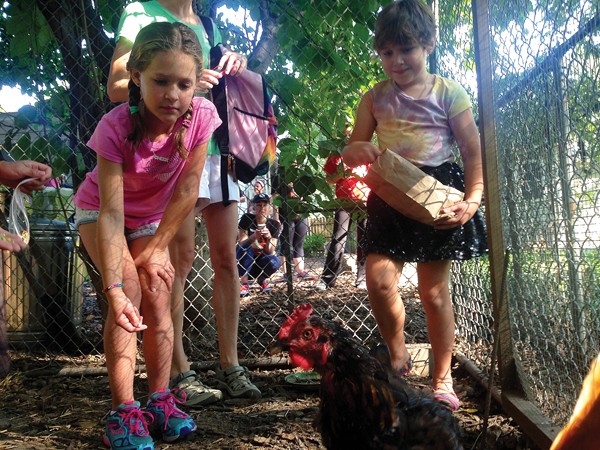Joni Laney admits her chickens “do have a lot of doo-doos,” but that’s really why she got them.
Laney’s coop is a chain-link fence with an elevated wooden box in the middle, all of it about the size of two office cubicles. Last Saturday morning, it was filled with children offering up handfuls of feed to her chickens.
The chickens cackled, clucked, and strutted wide-eyed the way chickens do. But they seemed altogether unafraid of the tiny visitors. Meanwhile, Laney talked up chicken cooping to a group gathered in her backyard.

Children feed Joni Laney’s chickens during Saturday’s Tour De Coop bicycle tour.
If I squinted just right and applied the right dose of imagination, I could imagine I was back home in Middle Tennessee, set in a landscape of my rural upbringing.
Then, the fog of my imagination was broken, Laney’s voice was overpowered, and I was squarely back in Midtown Memphis. A FedEx jet wooshed and whistled overhead on its way to Memphis International Airport.
Laney’s Binghampton home on McAdoo Avenue was one stop of several on Saturday’s Tour de Coop, a bicycle tour of Memphis chicken coops, backyard beehives, and urban gardens. The tour, now in its second year, was a fund-raiser for GrowMemphis, a nonprofit that helps locals grow or raise their own food.
The tour was intended to get people out in the community and get them talking, according to GrowMemphis Executive Director Carol Colter.
“The more we do these kinds of outreach activities and the more we talk about them as a normal activity in our urban environment, it’s more accepting for other people to consider doing it,” Colter said. “A lot of people assume there are a lot of barriers and things they’re not able to do because they live in an urban environment. But when they come into contact with [those who already do it] and shake this person’s hand and talk to them they realize, ‘Oh, this isn’t so hard, and I can do this.'”
Urban gardening, beekeeping, and keeping chickens are not new ideas here. The city’s Unified Development Code made rules allowing and regulating the construction of chicken coops and beehives two years ago.
But it has taken root here, enough for Colter to call it “mainstream.” It’s a description that may be generous depending on who is asked. It is also hard to quantify. But consider that there are 27 urban gardens in the GrowMemphis network alone. Also, consider a closed Facebook group called Midtown Chicken People has 270 members.
Colter thinks that maybe the availability of vacant land makes Binghampton an urban gardening hot spot. Laney says being a diverse neighborhood helps, too, noting one neighbor keeps a rooster and another had peacocks.
She’s had her chickens for two-and-a-half years, she says, and she loves all the fresh eggs (“The yolks are so yellow!”). But the decision to get chickens in the first place was really about their, ahem, by-product. Her husband uses the chickens’ manure in a huge community garden filled with bright red tomatoes, strawberries, and tons of other edibles.
“My job is to take care of the chickens, and he gets the doo-doo and takes it to the garden,” Laney says. “He just wheelbarrows it up the street and right into the garden. It’s really good for the soil.”